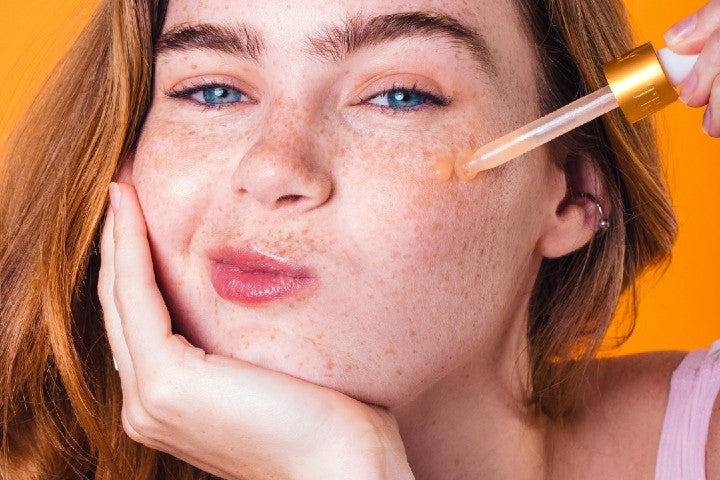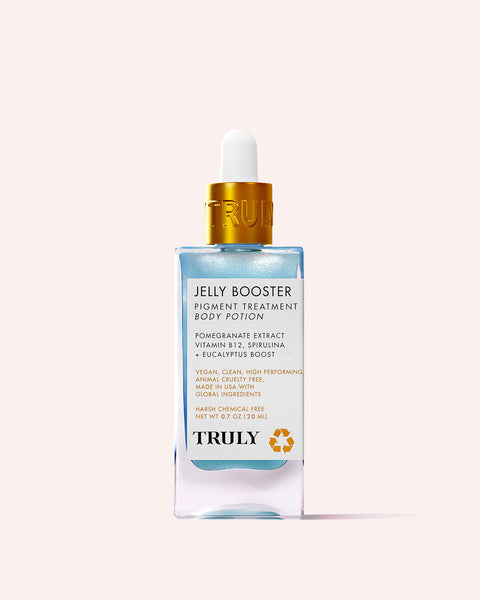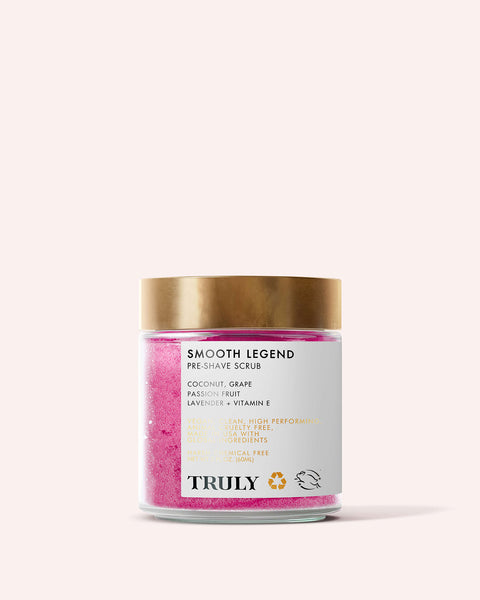Vitamin A in Skincare: What You Should Know

Vitamin A, or retinol, – as it is widely known – is one of those skin-transforming ingredients we’ve all heard of. But do you know anything more about it other than its robust reputation?
Retinol is a retinoid derived from vitamin A. Its main benefits include reducing fine lines and wrinkles, lowering oil production, stimulating collagen production, and fighting acne.
There’s a lot of confusion surrounding retinol and retinoids. Are they the same? Are they two different things?
We’re here to clear up the misunderstandings and misconceptions about vitamin A and retinol. Here’s what you need to know.
WHAT IS VITAMIN A?
Let’s cut to the chase: vitamin A is the name of a group of retinoids. There are three different states of vitamin A: retinol, retinal and retinoic acid. Retinoic acid is the strongest, prescription-level retinoid often used to treat severe cases of acne, like cystic acne.
They all offer the same types of skincare benefits, but the way they work on the skin differs slightly.
“Vitamin A as a skincare ingredient has been more extensively studied than any other ingredient on the market today,” says board-certified dermatologist Dr. Robyn Gmryek of Park View Laser Dermatology in NYC. “Retinoids were first used in dermatology in 1943.”
Vitamin A is mainly known for its anti-aging effects, with numerous studies proving its worth in reducing the appearance of fine lines and wrinkles.
“Vitamin A or retinol is the gold standard in skin ageing,” says clinical facialist Kate Kerr. “The reason this ingredient is so effective is that it is a cell-communicator. It attaches itself to skin cells and tells them to behave like younger, healthier versions of themselves.”
For a youth boost, try Truly’s Vegan Collagen Bundle, featuring four retinol-formulated skincare products to plump, smooth, and revitalize your complexion.
WHO SHOULD USE VITAMIN A?
According to dermatologists, your 20s is the best time to introduce retinoids into your skincare routine – especially if you suffer from acne.
Start with a retinol or retinyl palmitate 2-3 times a week. Use it over three months to see how your skin responds to it.
“Retinol helps speed up cell turnover, thickening the dermis for plumper, younger looking skin and a brighter, more glowing complexion, and it really helps improve hyper-pigmentation, acne, large pores, lines and wrinkles,” says Kerr.
BENEFITS OF RETINOL FOR SKIN
There’s a reason retinol is chosen as one of the most transformative skincare ingredients out there. It’s that good. Here’s what it can do.
Smooths out Creases
“As retinol binds to retinoid receptors on the skin, it enhances cell turnover and stimulates collagen production,” says skincare expert Dr. Joshua Zeichner.
It’s essentially exfoliating away old skin cells and stimulating the regeneration of newer, smoother cells. What’s more, vitamin A thickens the skin’s deeper layers and improves its ability to retain water, making fine lines and wrinkles less visible.
Banishes Acne
Because retinol is usually marketed as an anti-aging formula, it doesn’t get as much attention as it deserves for its acne-fighting superpowers. And yet prescription-strength vitamin A was first FDA-approved as an acne treatment. Interesting...
According to experts, retinol helps normalize oil production and offers exfoliating properties to unclog pores.
“Retinoids are great for preventing and treating acne, especially comedones [blackheads] because they help unclog pores,” says dermatologist Lela Lankerani. “And because of its collagen-stimulating ability, it can be beneficial for post-inflammatory hyperpigmentation and scarring.”
Improves Skin Tone and Texture
Thanks to its exfoliating abilities, vitamin A thins the very top layer of the skin. This and cell turnover can help minimize skin pigmentation and even out skin tone and texture. Retinol can also make other skincare products work harder.
HOW TO USE RETINOL ON YOUR SKIN?
Start slowly. If you apply too much too regularly, you could experience irritation from retinol.
“At night-time only, apply a pea-sized amount of retinol to clean and dry skin, avoiding the eye area,” recommends Linda Blahr, Head of National Training at SkinCeuticals. “For optimal results, wait at least 30 minutes before applying other skincare products.”
If you’re new to retinol, you may want to avoid wearing it daily at the beginning. Preferably, try incorporating it into your routine 2-3 times per week to lessen your chances of experiencing irritation.
Invest in Truly’s Glow-Up Kit complete with a retinol-formulated face mask and serum and hydrocolloid-infused acne patches.
SIDE EFFECTS OF VITAMIN A
You must use retinol with care if you want to avoid unpleasant side effects.
“Side effects include irritation, dryness, and photosensitivity, and in some cases even blistering and peeling,” says cosmetic chemist David Petrillo.
Avoid wearing retinol without sun exposure, as retinoids break down in sunlight and make your skin a lot more sensitive.
“Retinoids are prone to increase photosensitivity within the skin,” says Blahr. For that reason, “always use a high, broad spectrum sunscreen the next morning when using this product.” Alternatively, stick to using retinol in the evening instead when you don’t plan on exposing your skin to the sun.
WHO SHOULD AVOID USING RETINOL PRODUCTS?
According to research, retinoids may cause birth defects. Thus, doctors advise against using these products if you’re pregnant or trying to get pregnant.
One should also proceed with caution if you have eczema-prone skin, as retinoids may aggravate your dryness and cause further irritation.
HOW LONG WILL IT TAKE TO SEE RESULTS?
Dermatologists say it can take anywhere from three to six months of consistent use before you start seeing improvements. It all depends on a few factors.
“Because retinol relies on our skin’s ability to convert it into the active retinoic acid, this may not always give quick or consistent results,” says dermatologist Dr. Erum Ilyas. “The amount of active retinoic acid formed is based on how much retinol is in the product, our skin’s ability to convert it into retinoic acid, and time for the process to occur.”
Make it a regular part of your nighttime skincare routine, and you’ll gradually notice your skin improving. Retinol (or vitamin A) is a worthy investment!








